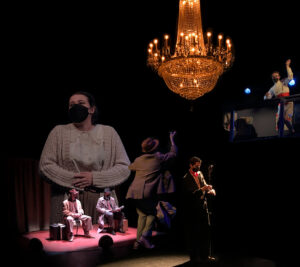A hand-painted fjord—strikingly vast and illuminated by blue lights—greets every person walking into the Village C Theater for Nomadic Theatre’s Ghosts. In the distance, hills undulate and the bracing ocean looms threateningly. The lights dim; darkness descends.
A woman emerges from the dark shadows, pacing back and forth. She trembles uncontrollably. Her eyes are fixated on something in the distance. In horror, she sprints to the door, slamming it shut. Did she have a harrowing vision of the past? Or did she witness a tormenting event unfold in the present? This is our first impression of the tenacious Mrs. Alving (Claire Cable, CAS ’25). Cable’s chilling, hair-raising performance sets the tone for the rest of the play.
Henrik Ibsen’s Ghosts, Nomadic Theatre’s spring production, is a three-act drama centered on Mrs. Alving, a dutiful widow who dedicates an orphanage in honor of her late husband. Although Captain Alving is dead, his legacy haunts the living. Throughout the play, the characters move emotionally closer to and further from each other, repulsed, yet pulled in by some magnetic force of attraction. Doors open. Doors shut. The audience is left to contemplate what happens outside the room; what sinful, incestuous affairs occur beyond the scope of the confined space?
The chemistry between the actors is palpable. As the door to Mrs. Alving’s estate opens, a clandestine meeting takes place between the lively Jakob Engstrand (Tai Remus Elliot, an exchange student) and his purported daughter, Regine (Anna Kummelstedt, SFS ’25). Their cheek-by-jowl interaction begins as joyful banter, gradually tapering into deeper, existential arguments. Kummelstedt is sharp-witted and outspoken, and, with hands on her hips, she successfully channels Regine’s assertive nature. Elliot’s boisterous performance as her father is as compelling. His jollyful raconteur-like bluff cuts through his daughter’s pointed remarks, painting him as a dubious, yet warm person. This peculiar interaction prompts the audience to question if Regine is actually Engstrand’s daughter.
Director CC Mesa (SFS ’26), does not shy away from shedding light on the nonchalant dismissal of women’s intelligence in Ghosts. In one scene, Pastor Manders (Will Kennedy, CAS ’25) consults Mrs. Alving on the orphanage’s finances. Standing upright and tall, Manders invites Mrs. Alving to read through the papers. Within a few seconds, he snatches the paper from her in a pompous movement, leaving the audience chuckling at the impropriety. This not-so-subtle gesture pokes fun at the misogyny of 19th-century society, defining Manders as a somewhat rigid, yet comedic caricature.
Kennedy masterfully strikes a balance between gravity and comedy. A few chuckles arise from the audience as he struggles to maintain his respectable gentleman-like facade. At one point, uproarious laughter fills the theater when Manders stomps away from Mrs. Alving’s overly affectionate attempt to kiss him. Manders’s immediate repulsion and Mrs. Alving’s natural instinct to move closer to him heightens the implication that there may have been a romantic relationship between the two.
Brendan Teehan (CAS ’25), who plays Mrs. Alving’s son, Osvald, sells an equally poignant performance. With his shirt loosely unbuttoned, he makes his first appearance strutting through the room with a free-spirited essence that can only be described as joie de vivre. At first glance, Osvald appears to be defiant—a force of nature challenging the rigid social conventions of 19th-century Norway. His take on what “honorable men” do outside of their family homes is refreshing. His respect for non-nuclear families is progressive. His joy of life exists when social norms are deconstructed. However, hints of Osvald’s tragic arc gradually unravel throughout the play. His artistic temperament is soon recognized as a trait passed down from his father. His enlightening discussion with Manders about what a family home is causes Mrs. Alving to silently pace back and forth in trepidation. Her behavior alludes to a troubling secret.
Ghosts is driven by echoes of the past. It is soon revealed by Mrs. Alving that her husband had an affair with his maid. The haunting, omnipresent words, “let me be,” uttered by the maid when she was in a private room with Mr. Alving, ring in Mrs. Alving’s ears for the rest of her life.
Even more salacious is the fact that Regine is the daughter of Mr. Alving. Osvald’s controversial affair with Regine, his half-sister, mostly blossoms offstage. He gives Regine glances of longing before exiting the room. The door is left slightly ajar, teasing the glimpse of happenings in a different room. Yet, we can never fully pull back the veil, and see what lies beyond the exposed set. The audience is left to imagine what happens between the two forbidden lovers. Echoes of the past, the haunting words “let me be” are uttered offstage, foreshadowing tragedy.
Though each person involved in Ghosts shines on their own, the cast and crew together are responsible for successfully creating the play’s ultimate tragic ending. Osvald lies on his deathbed, staring out into the void. His eyes are red, tinged with desperation. He suffers in the latest stages of syphilis, a hereditary illness that is passed down from his father. Cable lets out a tour-de-force, guttural scream. A cry that any mother in the audience could not bear to listen to. She holds her son’s face close to her own. For the first time, warm light seeps through the room. The fjord is lit up, more luminous than ever. The sloping hills, the cornflower blue skies, and flowing oceans stand out before the whole world.
The double entendre, “ghosts,” lingers as we leave Village C Theater. The past can continue to haunt us as recurring visions or it can be reenacted, taking form and shape in our successors.





